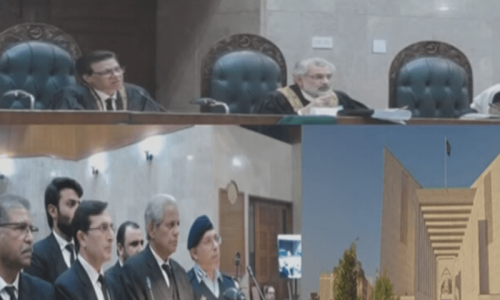The successive resignations of Supreme Court judges test the resilience of the judicial system, pre-election disputes strain the inner cohesion of political parties, and stagflation pushes the endurance levels of the working masses.
While the country slowly moves forward despite daunting challenges with the support of donors, the GDP gap not only persists but has likely been growing. The GDP gap, signifying the disparity between actual and potential GDP over a long-term trend, is a globally tracked metric. Given its substantial potential, why is the GDP gap not closing?
The private sector in Pakistan and the government engage in trading blame for this gap. Certain experts point to the archaic mindset prevailing among leadership (both in the public and private sectors) and the management team conditioned to operate within a protective, patronage-centric environment as crucial factors contributing to economic underperformance. According to them, these elements often lack the readiness to compete in the global market and display reluctance towards risk-taking.
Pakistan, however, doesn’t rank among the worst performers globally. Information circulating through social media platforms suggests that conflict-ridden countries, including Ukraine, Sudan, Myanmar, Haiti and Iraq, have larger negative GDP gaps.
Archaic mindsets and policy issues prevent the country from achieving its economic potential
Pakistan is mentioned in the context of clusters of underperformers. According to a report on social platforms, there are also negative gaps in specific regions, including Latin America (Peru, Bolivia, Paraguay, and Chile), South/Southeast Asia (Pakistan, Nepal, Bhutan, Myanmar, Thailand, Laos), and West-Central Africa (Ghana, Burkina Faso, Gabon). While verifying or authenticating the data used is challenging, the results seem plausible.
In private conversations, business leaders share numerous instances where government policies have compromised their business prospects, almost penalising success in entrepreneurship.
One tycoon pointed out, “The primary focus of economic ministries seems to be extracting the maximum resources through multiple taxes and duties to the extent that it de-incentivise balancing, modernisation and restructuring (BMR), as well as fresh investment in the industry.”
Another prominent leader in the food industry lamented, “We have halted our expansion plans due to the government’s hostile attitude. While our brand is well-received overseas, the current levels of duties on imported inputs, coupled with record-high taxes, make further investment to improve and enhance production capacity unviable. It is quite frustrating to witness other suppliers gaining ground in our market.”
Several former officials of economic ministries present their perspectives, portraying the business class of the country in a negative light. One official remarked, “The business class in Pakistan is often seen as parasitic. They appear spoiled and lazy, addicted to concessions. Many shamelessly leverage personal connections for favourable Special Regulatory Orders (SROs).
“There seems to be a lack of drive to excel and an aversion to healthy competition. They prefer taking full credit for success but are quick to blame external factors for failures, even when those failures stem from their own miscalculations and missteps.
“Their inclination to invest rests on the willingness of the government to bear the burden of risks. Ask any commerce secretary, and they would likely recount numerous instances where unprofessional conduct of Pakistani seths led to embarrassment at global forums and with trading partners.”
Musadaq Zulqarnain, Chairman of Interloop, the third largest exporter with a brand recognised for product quality, expressed dissatisfaction with the generalisation of Pakistani businessmen as incompetent and rent-seeking. He noted, “While there might be a trend of seeking instant success by fair means or foul, it is not the sole cause of the underperformance of Pakistani economy.
“The challenges include lack of strategy, insufficient talent development and a reluctance to build long-lasting sustainable businesses. Simultaneously, there is limited interest in investing in productive projects due to incentives favouring investment in non-productive avenues with relatively lower risk.”
Muhammad Younus Dhagha, Caretaker Minister in Sindh for revenue, industries and commerce, who served on both sides of the fence, earlier as a federal secretary for the government and later in the private sector as an adviser to the president of the Federation of Pakistan Chamber of Commerce and Industry believes that both public and the private sectors bear responsibility.
When discussing untapped potential, he attributed the challenges to “Policy paralysis and short-term-ism on the part of the government and lack of imagination and risk aversion on the part of the private sector”.
The head of an economic research body, who chooses to remain anonymous, made a pointed remark when discussing the subject. “The system in Pakistan promotes the pursuit of making money easily. The privileged class utilises plots, perks, protocols, and sometimes direct transfers.
“They engage in the exchange of assets through gifts, a practice deemed perfectly legitimate. Personal relationships and marriages are contracted to multiply wealth. This boundless accumulation of wealth receives protection through various subsidies, allowing it to multiply further. Even professionals face little competition as there’s no peer review or pressure to improve their skills. This situation has turned Pakistan into a perfect market for lemons.”
The society’s elite are unwilling to learn from missteps and continue on the path to destruction. Those who matter, key political leaders, and top businesses are all in this together,” said Asad Ali Shah, responding to the question of who is responsible for Pakistan’s economic underperformance.
Published in Dawn, The Business and Finance Weekly, January 15th, 2024
















































Dear visitor, the comments section is undergoing an overhaul and will return soon.